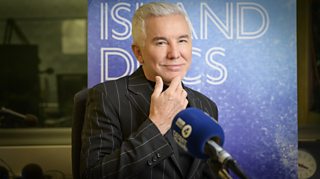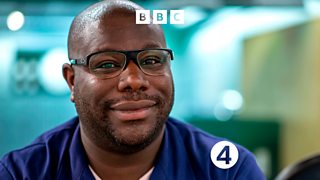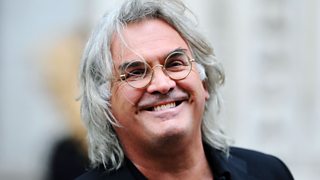Six things we learned from Baz Luhrmann's Desert Island Discs
The Australian director Baz Luhrmann found fame with his very first feature film Strictly Ballroom, based on his own experience as a young dancer. Since then, spectacle, visual flair and excess have become his cinematic calling cards, whether taking on classic texts such as Romeo and Juliet and The Great Gatsby, re-inventing the big-screen musical with Moulin Rouge or re-assessing an American icon in his most recent film Elvis.
Here’s what we learned from his Desert Island Discs...
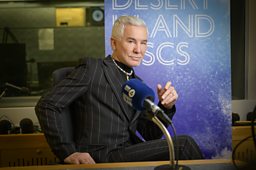
1. Marooned on a desert island? Baz says it would take him back to his childhood
“I grew up on a desert island," Baz jokes: he was born in Sydney in 1962, but when he was five the family moved to Herons Creek, a small and remote rural settlement in mid-northern New South Wales.
How I get into these messes? I don't know
“It really was isolated. It took us two hours to go to school and the first hour on the bus there was nobody on the bus, just the three of us [Baz and his brothers, Chris and Brett].”
His father ran a petrol station and then a cinema, while his mother ran a dress shop. His father also gave Baz an early introduction to cameras, encouraging him to take photos and make short films: “Dad taught me very early on how to process Box Brownie footage… I was an unstoppable photographer and filmmaker.”
2. As a boy, Baz set himself up as a radio DJ – broadcasting to customers buying petrol
“Dad was really big on music, and speakers and stereophonics,” Baz recalls. “So I rigged up the speakers and I had my own radio station [at the petrol station].”
“I'd be like: ‘Welcome to Radio M-O-B-I-L'. l was about seven, and there’d be people there getting their gas pumped. ‘Yep, let's hear that great John Farnham track, One is the loneliest number,’ - and the problem was I only had one record. It was a 45.”
“I got my brother to read the news… Oh poor Chris - he wasn't a great reader and it was like: ‘Hi, this is Chris Luhrmann, I'm going to tell you the sports news today...’. It would go on for two hours and I’d say, ‘Well, enough with the sports news, back to the great John Farnham...”
And Baz selects that childhood favourite disc as his second choice for his desert island: John Farnham’s version of One, a song by American singer-songwriter Harry Nilsson, was a top 10 hit in Australia in 1969.
3. The first verdict on his film debut, Strictly Ballroom, was savage
Strictly Ballroom started life as a stage show co-written and produced by Baz. He was encouraged to turn it into a film by the Australian music executive Ted Albert, who had seen the play with his wife Antoinette.
“The struggle, the struggle, the struggle!” Baz recalls, looking back at how hard it was to get the film funded and made. And what did the first viewers make of it?
“We finally screen it to the one guy who's given us one cinema to screen it in and I kind of throw up because I'm so nervous. He leaves and he says: “That is the worst movie I've ever seen and you've destroyed Pat’s career.”
The Pat in question is English-born Australian actress Pat Thomson, who plays Shirley Hastings, ballroom dancing teacher and mother of the rebellious dancer Scott.
“She doesn't learn that a year later, because she dies before she learns,” says Baz, “that she wins best actress for that role.” Pat won the AFI (Australian Film Institute) Award in 1992.
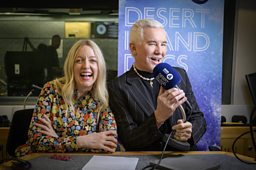
4. A festival screening in France proved a life-changing moment
After the initial poor response to Strictly Ballroom, Baz headed up the Australian coast: “I'm at a trailer park. A guy gets killed by a [falling] coconut. The phone rings on an old Bakelite phone, an old woman says: ‘There's a guy on the phone,’ and I'm holding a bucket on my head because I don’t want to be killed by a coconut and I hear a French voice and he says: ‘My name is Pierre, I’m from the Cannes Film Festival and I'm going to give you a 12 o'clock screening.’”
I think like all great relationships they're mysterious to everyone else, but the people that are in them
“The rest is history. We have the first screening and there's a great reaction, but it’s only about 2/3 full. Unprecedented, they come for a second screening and there's a riot trying to get in... people rioting to try and get into the movie, and a French security guard grabs me and he says: ‘Monsieur, from this moment on your life will never be the same again,’ and it wasn't really.”
The fervour of the audiences in Cannes soon translated into commercial success and prize nominations around the world.
5. Controversy marked his move into opera too
When Baz looks back at his first production of Puccini’s opera La bohème, in Sydney, he has strong memories of the divisions it provoked.
“How I get into these messes? I don't know. But I remember the first Iraq war had broken out and when our production came on, which was sort of a stripped down Brechtian kind of version of it with this young singer, there were more letters to The Australian, which is our big newspaper, about our La Boheme than about the Iraq war breaking out.”
“It was such a controversy. One of the critics had weighed in and said it was the worst thing that could ever happen to opera. But [the soprano] Joan Sutherland, who was an icon - she's up there with Maria Callas - she said ‘I think it's amazing’ and that was the beginning of my opera career.”
Luciano Pavarotti singing Che gelida manina from La bohème is another of Baz’s castaway choices.
6. He’s enjoyed a very long professional partnership with his wife
Early in his career, Baz founded his own theatre company and was looking for a designer: “I went back to my drama school, and the head of the school said: ‘There is this girl… and [she’s] outstanding.’ The girl had made a design project where a fridge ate her...”
Baz was intrigued, and met her. “We were having an hour meeting and I think four hours later we're still talking about Bertolt Brecht and Madonna, and that conversation has continued since then,” says Baz of his wife and long-time collaborator, Catherine Martin, who he affectionately refers to as CM.
“So we start this collaboration and we have our world. We have our relationship. It's very real, it's very particular and I think like all great relationships they're mysterious to everyone else, but the people that are in them.”
“And we still are having that conversation, and there is still a great love and romance between us. Love transforms as you grow. Your teenage love is champagne… but the depth of our relationship in our understanding. I don't ever think I want a day when [she’s] not around. That's how important she is in my life."
Catherine Martin won two Oscars for Moulin Rouge in 2002 and another two for The Great Gatsby in 2014. As the winner of four Academy Awards for production and costume design, she is the most awarded Australian in Oscar history.

